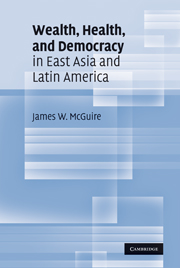Book contents
- Frontmatter
- Contents
- Figures and Tables
- Preface and Acknowledgments
- Abbreviations
- 1 Incomes, Capabilities, and Mortality Decline
- 2 Democracy, Spending, Services, and Survival
- 3 Costa Rica: A Healthy Democracy
- 4 Chile: The Pinochet Paradox
- 5 Argentina: Big Welfare State, Slow Infant Mortality Decline
- 6 Brazil: From Laggard to Leader in Basic Health Service Provision
- 7 Taiwan: From Poor but Healthy to Wealthy and Healthy
- 8 South Korea: Small Welfare State, Fast Infant Mortality Decline
- 9 Thailand: Democratization Speeds Infant Mortality Decline
- 10 Indonesia: Authoritarianism Slows Infant Mortality Decline
- 11 Wealth, Health, Democracy, and Mortality
- Appendix Tables
- Works Cited
- Index
1 - Incomes, Capabilities, and Mortality Decline
Published online by Cambridge University Press: 06 July 2010
- Frontmatter
- Contents
- Figures and Tables
- Preface and Acknowledgments
- Abbreviations
- 1 Incomes, Capabilities, and Mortality Decline
- 2 Democracy, Spending, Services, and Survival
- 3 Costa Rica: A Healthy Democracy
- 4 Chile: The Pinochet Paradox
- 5 Argentina: Big Welfare State, Slow Infant Mortality Decline
- 6 Brazil: From Laggard to Leader in Basic Health Service Provision
- 7 Taiwan: From Poor but Healthy to Wealthy and Healthy
- 8 South Korea: Small Welfare State, Fast Infant Mortality Decline
- 9 Thailand: Democratization Speeds Infant Mortality Decline
- 10 Indonesia: Authoritarianism Slows Infant Mortality Decline
- 11 Wealth, Health, Democracy, and Mortality
- Appendix Tables
- Works Cited
- Index
Summary
Much research has been devoted in recent years to identifying causes of crossnational variation in premature mortality, as measured by such indicators as infant mortality and life expectancy at birth. This research addresses an important topic. Avoidance of early death is a necessary condition for anything else we might wish to achieve. Also, societies with high rates of early death tend to suffer from other sorts of deprivations. Hence, it is well worth identifying reasons why premature mortality is lower, or falls faster, in some societies than in others.
Public health issues are neglected in the literature on the comparative politics of developing countries, and political science issues are neglected in the field of public health. By connecting a public health issue to a political science issue, this book encourages dialogue between the two fields. On the public health side, its aim is to weigh the importance of social service provision on the one hand, and of economic output- and income-related factors on the other, on infant mortality levels and changes in developing countries from 1960 to 2005. On the political science side, the goal of the book is to explain why some developing country governments did better than others at designing and implementing mortality-reducing social services.
The analyses reported in this book challenge some conventional wisdom about economic and social progress in developing countries. Such progress is typically measured according to economic output- and income-related indicators like GDP per capita, income inequality, and income poverty.
- Type
- Chapter
- Information
- Publisher: Cambridge University PressPrint publication year: 2010



